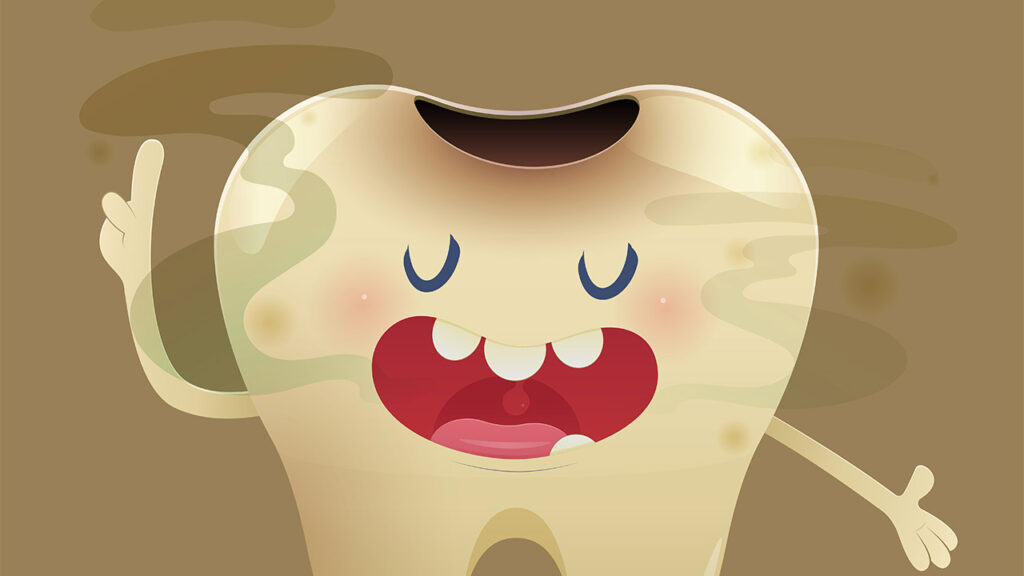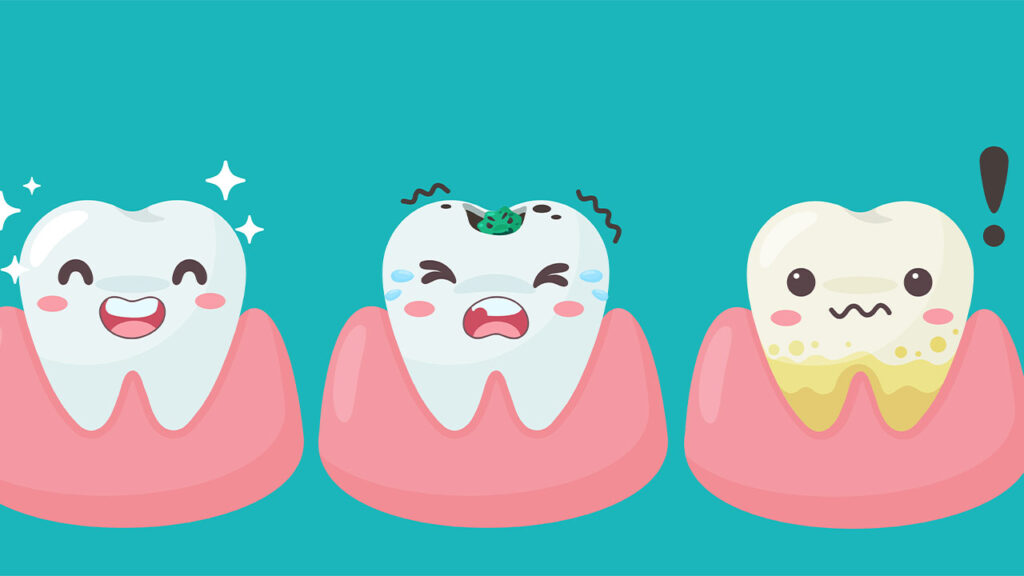The teeth are one of the most important parts of our body. They not only help us to chew food but also play a vital role in our appearance and communication. However, just like any other part of our body, teeth are prone to various problems that can affect their health and functionality. In this blog, we will discuss the three main problems related to teeth and how to prevent and treat them.
Problem 1: Tooth decay

Tooth decay, also known as dental caries or cavities, is a common dental problem that affects people of all ages. It is caused by the breakdown of tooth enamel, which is the hard, outer layer of the tooth. If left untreated, tooth decay can lead to serious dental problems such as infection, tooth loss, and gum disease.
- Causes of tooth decay: The main cause of tooth decay is the build-up of plaque on the teeth. Plaque is a sticky, colourless film of bacteria that forms on the teeth and gums. The bacteria in plaque produce acids that can erode the tooth enamel and lead to cavities. Other factors that can contribute to tooth decay include poor oral hygiene, a diet high in sugar and carbohydrates, dry mouth, and certain medications.
- Symptoms and signs of tooth decay: The early stages of tooth decay may not produce any symptoms, but as the decay progresses, you may experience tooth sensitivity, pain when biting or chewing, visible holes or pits in your teeth, or black, brown, or white spots on your teeth.
- Treatment and prevention of tooth decay: Treatment for tooth decay depends on the severity of the decay. In the early stages, your dentist may recommend fluoride treatment, which can help to strengthen the tooth enamel and prevent further decay. In more severe cases, a filling or root canal may be necessary. To prevent tooth decay, it is important to brush your teeth twice a day, floss daily, limit sugary and acidic foods and drinks, and visit your dentist regularly for check-ups and cleanings.
Problem 2: Gum disease
Gum disease, also known as periodontal disease, is a chronic bacterial infection that affects the gums and bones that support the teeth. It is a serious condition that can lead to tooth loss if left untreated.
- Causes of gum disease: The main cause of gum disease is the build-up of plaque on the teeth and gums. When plaque is not removed through brushing and flossing, it can harden into tartar, which can only be removed by a dental professional. Tartar build-up can cause inflammation and infection of the gums, leading to gum disease. Other factors that can increase your risk of gum disease include smoking, hormonal changes, certain medications, and genetic predisposition.
- Symptoms and signs of gum disease: The early stages of gum disease may not produce any symptoms, but as it progresses, you may experience swollen, red, or tender gums, bleeding gums when brushing or flossing, bad breath, or loose teeth.
- Treatment and prevention of gum disease: Treatment for gum disease depends on the severity of the condition. In the early stages, your dentist may recommend a professional cleaning to remove the tartar and bacteria from your teeth and gums. In more advanced cases, surgery may be necessary to remove the infected tissue and restore the health of your gums. To prevent gum disease, it is important to brush and floss your teeth regularly, quit smoking, eat a healthy diet, and visit your dentist regularly for check-ups and cleanings.
Problem 3: Tooth sensitivity
Tooth sensitivity is a common dental problem that can cause discomfort or pain when consuming hot, cold, sweet, or acidic foods and drinks.
Causes of tooth sensitivity: Tooth sensitivity is caused by the exposure of the tooth’s inner layer, known as dentin. The dentin contains small tubules that lead to the tooth’s nerve endings, and when these tubules are exposed, they can become sensitive to various stimuli. Common causes of tooth sensitivity include: –
- Brushing too hard: Brushing too hard can cause enamel wear and gum recession, exposing the dentin and causing sensitivity.
- Gum recession: Gum recession occurs when the gums pull away from the tooth, exposing the root surface and causing sensitivity.
- Tooth decay: Tooth decay can cause dentin to become exposed, leading to sensitivity.
- Grinding or clenching teeth: Grinding or clenching your teeth can wear down the enamel and expose the dentin, leading to sensitivity.
- Acidic foods and drinks: Consuming acidic foods and drinks can erode the enamel and expose the dentin, leading to sensitivity.
Symptoms and signs of tooth sensitivity: The most common symptom of tooth sensitivity is pain or discomfort when consuming hot, cold, sweet, or acidic foods and drinks. Other signs of tooth sensitivity may include: –
- Pain when brushing or flossing teeth.
- Pain when breathing in cold air.
- Pain or discomfort when touching the affected tooth.
Treatment and prevention of tooth sensitivity: Treatment for tooth sensitivity depends on the cause and severity of the condition. Common treatments for tooth sensitivity include: –
- Desensitizing toothpaste: Desensitizing toothpaste can help block the tubules in the dentin, reducing sensitivity.
- Fluoride treatment: Fluoride can strengthen the enamel and reduce sensitivity.
- Dental bonding: Dental bonding can be used to cover the exposed root surface, reducing sensitivity.
- Gum grafting: Gum grafting can be used to cover the exposed root surface and reduce sensitivity.
To prevent tooth sensitivity, it is essential to practice good dental hygiene, including brushing twice a day with a soft-bristled toothbrush, flossing daily, and using fluoride toothpaste. Avoid brushing too hard, using abrasive toothpaste, or consuming acidic foods and drinks.
healthcareDental health is an important aspect of overall health and well-being. Take control of your dental health with our top-quality dental health care products. Say goodbye to painful and inconvenient dental issues and hello to a brighter, healthier smile.
These products are designed with the latest technology and are made from premium materials, ensuring that you get the best results. Whether you’re looking for a solution for sensitive teeth, gum health, or just want to keep your smile sparkling, our dental health care products have got you covered.
Tired of hiding your smile due to yellowing, stained, or sensitive teeth?
ProDentim is here to help. This advanced formula whitens and strengthens your teeth, while also reducing sensitivity and promoting oral health. Say goodbye to expensive and painful dental treatments, and start enjoying a bright, confident smile with ProDentim.
Click Here to Try ProDentim now and see the results for yourself!
Struggling with tooth sensitivity, gum problems or bad breath?
Dentitox Pro is the solution you need. This natural, effective formula helps to clean and strengthen your teeth and gums, giving you a brighter, healthier smile. Dentitox Pro is made with the finest ingredients and is free from harmful chemicals, making it safe and gentle for everyday use. Say goodbye to pain and embarrassment, and start enjoying a confident, beautiful smile with Dentitox Pro.
Click Here to Order now and get 20% off your first purchase!
Click Here for Professional Teeth Whitening
Frequently Asked Questions About 3 problems related to teeth
What are the most common causes of tooth decay?
Tooth decay is typically caused by the buildup of plaque on teeth, which is a sticky film of bacteria that forms on teeth and can produce acid that breaks down tooth enamel. Some of the most common causes of tooth decay include poor oral hygiene, a diet high in sugar and carbohydrates, dry mouth, and certain medical conditions.
How can I prevent gum disease?
Preventing gum disease involves practising good oral hygiene habits, such as brushing twice a day, flossing daily, and using mouthwash to kill bacteria. Eating a healthy diet that is low in sugar and carbohydrates can also help prevent gum disease. Regular visits to the dentist for cleanings and checkups are also important for maintaining gum health.
What are the best treatments for tooth sensitivity?
Treatment for tooth sensitivity depends on the cause of the sensitivity. If the sensitivity is caused by exposed tooth roots, treatment may involve applying a desensitizing agent or filling the exposed root surface. If the sensitivity is caused by tooth decay or infection, the tooth may require a filling, root canal, or other dental procedure.
Can tooth problems lead to other health issues?
Yes, tooth problems can lead to other health issues. For example, gum disease has been linked to an increased risk of heart disease, stroke, and diabetes. Tooth decay and infection can also spread to other parts of the body, potentially causing serious health problems.
When should I see a dentist for my tooth problems?
It is important to see a dentist as soon as possible if you are experiencing any dental problems, such as tooth pain, sensitivity, or bleeding gums. Additionally, regular dental checkups every six months can help detect any potential dental issues before they become more serious.
In conclusion, tooth decay, gum disease, and tooth sensitivity are three common dental problems that can cause pain and discomfort. It is essential to practice good dental hygiene, including regular dental check-ups, to prevent these problems and maintain healthy teeth and gums. If you experience any dental problems, it is essential to see a dentist as soon as possible to prevent further damage and ensure timely treatment.
